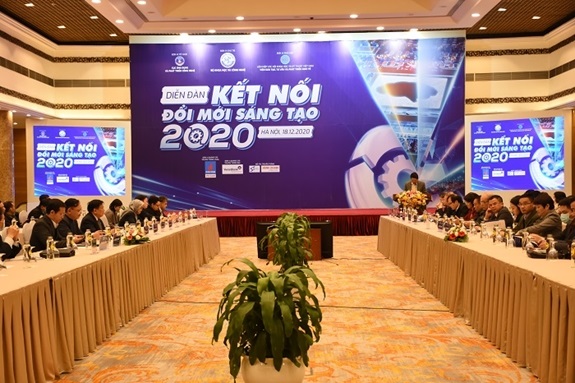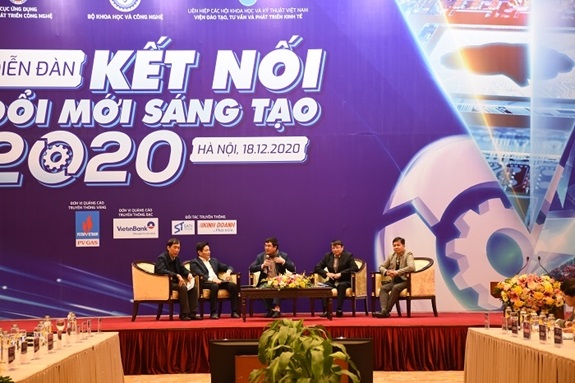However, not all Vietnamese enterprises can research and develop their technologies by themselves. They need to take a short cut by importing and improving technology for their own innovation process for development. how enterprises can absorb technology imported and transferred from abroad and how businesses need to perceive from innovation; they are the big question for Vietnamese businesses at present time.
Technology development based on import and technology transfer and should be noted, what support policies should be taken from the public sector when engaging in “integration games"?
According to representatives of State for Technology Innovation (SATI), Ministry of Science and Technology (MOST) at the Innovation Connectivity Forum 2020 held in Hanoi; MOST has advised the Government and the Politburo of Vietnamsese Communist Party to issue some resolutions to decide some policies oriented to support importing and technology transferring activities as follows:
Policies in priority for import and technology transfer:
Orientation of technology import and transfer shall give priority to the following fields: Information technology industry, electronics industry; mechanical engineering; High-tech for agriculture; preserving and processing technologies for agricultural and aquatic products; infrastructure construction technology; environmental technology to combat climate change; Medical and pharmaceutical technologies for diagnosis and treatment of diseases. Accordingly, the orientation for technology transfer import will focus on solving the following issues:
1) Prioritize projects with advanced technology, new technology, high technology, clean technology, modern governance technology with high added value contributions, spillover effects and connecting with global supply chains.
2) Perfecting laws and policies on FDI (foreign direct investment) in the direction of raising technology standards, encouraging forms of technology transfer joint venture between domestic enterprises and FDI enterprises;
3) It is not allowed to import the used equipments which the exporting countries have announced to remove due to obsolete and poor quality causing environmental pollution; Enterprises are encouraged to inspect used equipment from the exporting countries;
Promulgating lists of encouraged technology as well as list of restricted and banned technology .

Innovation Connecting Forum 2020 group photo (photo by VISTIP)
1) Support Orientations for import and technology transfer includes:
Supporting experts in finding and evaluating technologies, organizing activities to connect “supply& demand” of international technologies, building a database of technology-transfer and inventions (assisting in technology finding);
2) To prioritize funding for the import of sample products for analysis and decoding in order to develop technology; tax incentives for machinery, equipment ... that Vietnamese cannot make to be used for research, innovation or technology transfer activities (supporting in the process of technology import);

The experts discussed at the Forum ( photo: VISTIP)
3) Preferential rates of interest, loan guarantees, priority to investment for hi-tech zones; Products are encouraged for use in public projects and services; participate in science and technology projects and funds (supporting in research and technology ownership);
4) Prioritize the implementation of S&T tasks; funding for the purchase of copyrights, technological know-how and information on intellectual property; hire the experts; preferential credit, tax, land use; trade promotion and market development supporting (assisting in process of technology transfer).
According to Dr. Ta Viet Dung, Director of SATI solutions to support businesses in importing and transferring technology in the coming time need to address the following requirements:
1) Formulating and perfecting the system of mechanisms and policies, promotion the efficiency of state management, supporting the technology transfer, ownership and development of technologies from abroad into Vietnam;
2) Investing in technical infrastructure to support organs and enterprises to transfer, own and develop technologies from abroad into Vietnam; Improve the quality of human resources for businesses; higher education institutions as well as science and technology intermediary organizations;
3) Determine priority directions in sectors and fields according to each stage, in accordance with innovation requirements, production level and mastery capacity; self-designed and creative in the country;
4) To support organizations and enterprises in transferring, mastering and developing technologies from abroad into Vietnam;
5) International cooperation: promote to find, purchase, sale and technology transfer as well as strengthe cooperation with Vietnamese organizations, individuals in the overseas.
6) International technology supply-demand connecting; promote communication activities to raise awareness of the community to honor businesses and individuals with their great achievements.